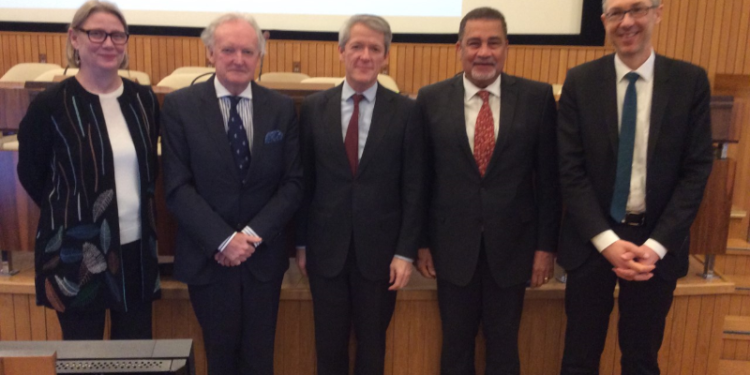Paris, January 29, 2020–The 24th January last was not destined to be an ordinary day for Ambassador David Doyle, the Federation’s permanent delegate to UNESCO in Paris. A few minutes into an information meeting hosted by UNESCO relating to the planning of the
UNESCO World Conference on Education for Sustainable Development to be held in Berlin in June, he argued for targeted funding to be considered to enable one education minister from each SIDS region to participate in this important strategic conference.
Attended by ambassadors, diplomatic staff and NGO’s, the information meeting focused on the Berlin conference organized by UNESCO in cooperation with and generously supported by the Federal Ministry of Education and Research of Germany, and with the German Commission for UNESCO as advisory partner.
Whilst Ambassador Doyle commending the long-standing support of Germany and UNESCO in treating SIDS as a priority group at the same level as LDCs and lower middle income countries, he noted that few SIDS education ministers had the resources to attend this conference: “Education for sustainable development constitutes a critical priority for small islands, transcending the Pacific, Caribbean, and Indian ocean, and indeed goes to the centre of national development strategies of these vulnerable states facing daily challenges related to climate change”.
He went to say: “One minister should invite to represent each of the four SIDS regions to actively participate in the UNESCO World Conference on Education for Sustainable Development”.
The proposal, vigorously backed by the Ambassador of the Seychelles, H.E. Louis Sylvestre Radegone, current President of the SIDS Committee at UNESCO, was carried forward.
The Honourable St. Kitts and Nevis Minister responsible for Education, Culture and Sports, Shawn Richards, will attend the Berlin conference and speak on behalf of the Caribbean education ministers over 2-4 June next. One education minister from each of the SIDS regions will also have a representational role at the conference, drawn for the Pacific, Indian Ocean and the SIDS off the African continent, Cape Verde and São Tomé e Príncipe.
Their presence at the conference will enable SIDS to offer responses to the multiple climate-change induced challenges facing small islands. As one of the 17 Sustainable Development Goals for 2030, Education for Sustainable Development (ESD) goal supports efforts to equip learners with the knowledge, skills, values and attitudes needed to contribute to a more inclusive, just, peaceful and sustainable world. In 2017, the UN General Assembly reaffirmed UNESCO’s role as the lead agency on ESD in its Resolution 72/222 and recognized ESD as ‘an integral element of the SDG on quality education and a key enabler of all the other SDGs’.
In contributing to further enhance ESD efforts, UNESCO launched the new framework ‘Education for Sustainable Development: Towards achieving the SDGs’ (ESD for 2030)1 and its roadmap for implementation at the Berlin conference.
Representatives from the SIDS regions will be called upon to speak about their political commitment to ESD for 2030 and how they want to take the implementation forward, with special emphasis on national-level implementation/national initiatives.
Noted Minister Richards: “Education for sustainable development is central to our government’s ongoing strategy by incorporating a range of values and knowledge, at all levels of the Federation’s academic structure, that contributes to raising awareness and promoting sustainable development of our twin-island states”.









